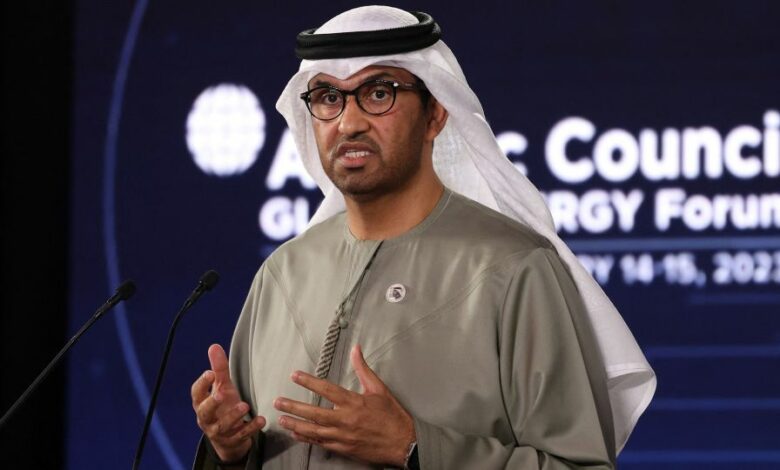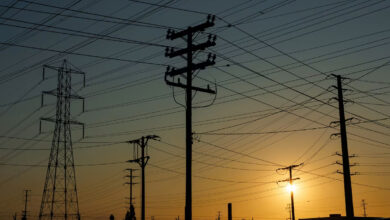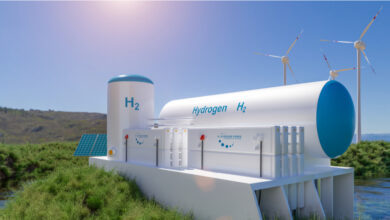
Environmental activists have cried foul, arguing that the climate debate has been hijacked by the fossil fuel lobby to protect the profit-maximizing agendas of petrostates.
The UAE’s involvement has sparked a discussion on whether there’s a place in the climate space for countries that rely primarily on fossil fuel exports for their income. And opinions are split.
Sultan Al Jaber, who will preside over the November summit, wears two very prominent hats in the UAE. Aside from being the CEO of the Abu Dhabi National Oil Company (ADNOC), he is also the UAE’s climate envoy, tasked with spearheading its energy policy. He took on the climate portfolio over a decade before becoming a top oil executive, helping launch the state’s clean energy company Masdar in 2006 and bringing the International Renewable Energy Agency’s headquarters to Abu Dhabi in 2009.
The message the UAE is sending is that both fossil fuels and renewable energy must be part of the global energy mix, and that one does not have to replace the other.
It has argued that given the projected growth in global energy demand, both clean and dirty energy will be needed to power the world, and a hasty transition away from oil and gas could have a detrimental effect on the global economy.
“Recent events have shown that unplugging the current energy system before we have built a sufficiently robust alternative puts both economic and climate progress at risk – and calls into question whether we can ensure a just transition that is equitable to all,” Al Jaber wrote last year in an opinion piece for Project Syndicate.
The US Energy Information Administration (EIA) estimates a nearly 50% increase in global energy use by 2050, with oil and gas remaining the most-consumed sources of energy.
Tom Evans, a policy adviser at the European climate change think tank E3G, told CNN that Al Jaber’s appointment raises questions about the credibility of the UAE’s COP28 presidency. “At face value, the head of a national oil company is obviously facing a massive conflict of interest,” he said.
Al Jaber’s dual roles are what make him a “terrific choice,” US Climate Envoy John Kerry was cited as saying by the Associated Press on Monday. The company he leads “knows it needs to transition,” Kerry said.
Simon Stiell, the executive secretary of the United Nations Framework Convention on Climate Change (UNFCCC) on Monday called the UAE’s hosting of the summit a “unique opportunity” at an environmental summit in Abu Dhabi. The UAE has the expertise “to get every sector, particularly those hard to abate, aligned with 1.5,” he said, referring to the climate goal to stay below 1.5 degrees Celsius of warming.
The UAE has touted the mantra of “maximum energy, minimum emissions,” saying that instead of phasing out fossil fuels, it will work on making their extraction cleaner, and reinvest its revenues into renewable energy in an effort to raise its share of the nation’s energy mix. The country is future-proofing its energy sector and will “celebrate” the last barrel of oil it exports, Al Jaber said at an energy summit in Abu Dhabi on Saturday.
Over the past 15 years, the UAE has invested $40 billion in renewable energy and clean technology globally, according to the Atlantic Council think tank. Last year, it entered a pact with the United States to invest another $100 billion in clean energy. Al Jaber on Saturday called for a tripling of renewable energy output around the world and twice as much money for adaptation in the global south.
But that’s not enough, climate experts say.
“Fossil fuel profits are most certainly not powering investments in clean energy,” Assaad Razzouk, a clean energy analyst in Singapore, told CNN. “Just look at the spending of oil and gas companies and how that’s allocated,” Razzouk said. Companies like ADNOC and Saudi Arabia’s Aramco oil company need to stop investing in oil and gas and spend much more on renewables if they are serious about the transition to clean energy, he added.
Global campaigner Corporate Accountability in November described the presence of oil lobbyists at climate summits as “a rise in the influence of the fossil fuel industry at the climate talks that are already rife with accusations of civil society censorship and corporate influence.”
Climate experts say the UAE’s approach of expanding the use of renewables while continuing to extract fossil fuels defies its own commitments. COP28 didn’t respond to CNN’s request for comment.
“The Glasgow Climate Pact agreed at COP26 in 2021 by all countries, including the UAE, calls for a cut of 45% in carbon emissions by 2030,” Mark Maslin, a professor working on climate change at University College London, told CNN. “This can only be achieved if there is no new investment in fossil fuels and the use of all fossil fuels is phased out as soon as possible.”
“So it does not make any sense to invest in fossil fuels when the world needs to be net zero emissions before 2050,” he added.
But the UAE is doing quite the opposite.
One of the few producers in the OPEC oil cartel with the capacity to ramp up production on short notice, the UAE has repeatedly called for more investment in the oil sector to meet global demand, and has embarked on a project to further increase its own capacity. In November, it brought forward its oil production expansion to 2027 instead of 2030, when it will be producing up to 5 million barrels per day (bpd) from about 4 million.
The UAE’s approach has been pragmatic, said Amena Bakr, chief OPEC correspondent at Energy Intelligence, adding that Russia’s war on Ukraine led nations to prioritize energy security and realize that the world couldn’t do away with oil and gas so soon.
“Renewable energy still cannot meet base-load energy demand – that’s a fact,” she told CNN.
For Razzouk, the clean energy analyst, the conflict has “incontrovertibly shown the folly of relying on imported fossil fuels, and the national security risks this entailed.”




